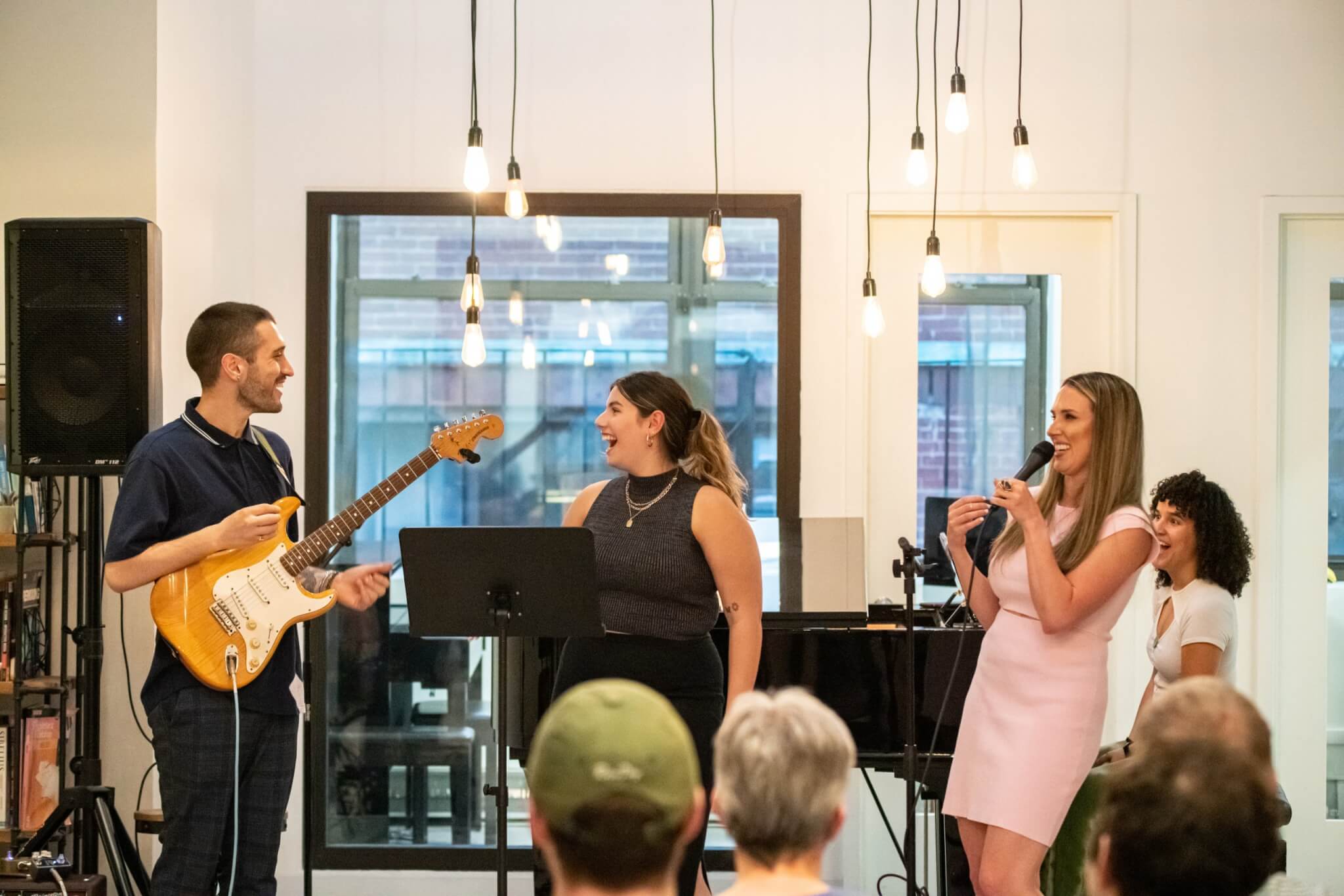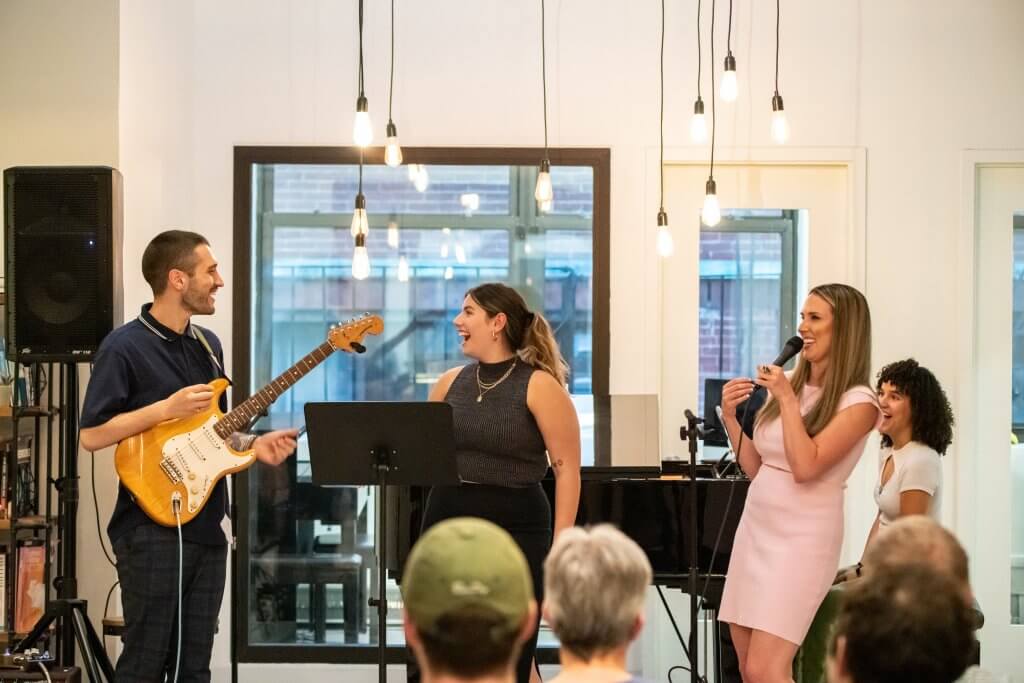Blog
5 Ways Music Lessons Boost Communication Skills

In today’s fast-paced world, effective communication is crucial for personal and professional success. However, only some possess innate communication skills, making it essential to seek compelling methods for skill development. Surprisingly, music provides an engaging and fun approach to building and strengthening essential communication skills.
Here are 5 ways that music, including piano and guitar lessons, can help develop and enhance communication skills:
1. Music enhances listening skills
Music demands active listening, teaching us to discern nuances, tones, and rhythms in the pieces that we spend time with. This attentive listening translates to better conversation understanding, making us more empathetic and responsive communicators. Music education often begins with learning to listen — not just hearing the sounds, but truly understanding and appreciating the layers and textures of music. Musicians train to discern the subtlest nuances in musical compositions, and their use of active listening skills directly translates into a successful performance. This discipline requires focused attention, as well as a presence of mind that is fully engaged with the task at hand. Much like an important conversation, this musical practice demonstrates how significant listening can be in establishing a shared understanding, which is ultimately the goal of any communicative message.
Active listening in conversations means giving our undivided attention to the speaker, absorbing not just their words but also the tone, pace, and underlying emotions. It’s about catching the quiet sighs between sentences, the excitement behind the words, and the hesitation that hints at unspoken thoughts. This level of engagement makes us more empathetic communicators, as we learn to truly understand and connect with others.
In music, response is everything. Musicians listen to each other and themselves, adjusting their performances to maintain harmony and balance. This rhythmic give-and-take is extremely similar to the flow of a good conversation. Active listening informs our responses, allowing us to contribute thoughtfully and meaningfully. It encourages us to ask insightful questions, offer relevant observations, and express genuine empathy. This responsiveness not only enhances our interactions but also strengthens our relationships. This skill is developed through regular music lessons, which can be beneficial not only in personal relationships but also in professional relationships.
2. Music fosters teamwork and social skills
Whether you’re practicing an instrument during a one-on-one private instruction class, or a unique team-building event, your communication skills are directly benefiting. Practicing music in a group setting encourages musicians to develop their skills of adaptability, which is increasingly important in today’s workplace. Musicians who actively practice improvisation, especially in genres such as jazz, blues, and gospel, are in turn developing their adaptability skills. They are actively listening to other musicians’ solos and riffs, then developing an appropriate melody or rhythm in response. This call-and-response that happens in a musical group practice setting mimics a healthy conversation. Being highly adaptable makes an individual stand out in the workplace. Why? Being adaptable allows team members to tailor their message to a specific audience or context, allowing their message to be understood more quickly and effectively than it would be otherwise.
The act of creating music in a group setting, whether in a band, orchestra, or choir, is a great metaphor for the collaboration and teamwork that enriches our social and professional lives. The ensemble experience teaches us invaluable lessons about unity, timing, and mutual support, shaping us into more effective communicators and collaborators beyond a simple jam session. In an ensemble setting, each member plays a distinct role, contributing their unique voice or instrument to the collective performance. This requires a deep understanding of not only one’s part but also how it fits into the larger composition. Musicians must listen to each other, anticipate changes, and adjust their timing to maintain harmony and balance.
This mirrors the dynamics of teamwork in various settings, where individuals bring diverse skills and perspectives to achieve a common goal. Effective collaboration hinges on the ability to coordinate efforts and understand how each person’s contributions fit into the larger picture. Like in music, success in teamwork is about creating a cohesive outcome that is greater than the sum of its parts.

3. Playing music helps strengthen memory and focus
Without a good memory or attentive focus, having a successful conversation– especially when drawn out through email chains, text threads, and outside factors– becomes almost impossible. Without a good memory, it becomes more difficult for an individual to speak with confidence and authority regarding a certain event. This lack of confidence makes it difficult for the individual to be trusted in a conversation, increasing the likelihood that the goal of a communicative message is misunderstood. Music can make this situation avoidable!
Music engages multiple areas of the brain, including those involved in auditory processing, emotion and memory. This widespread activation can enhance brain plasticity, the brain’s ability to reorganize itself by forming new neural connections throughout life. Engaging in musical activities, such as playing an instrument or listening to music, stimulates the brain and can improve memory function. Studies have shown that musicians tend to have better verbal memory, spatial reasoning, and literacy skills due to the extensive brain training involved in mastering their art. Taking piano lessons regularly can help to support the development of these auditory processes and connections in the brain.
Listening to music can improve focus and concentration, critical components of effective learning and memory formation. Certain types of music, such as classical music or specifically designed study playlists, can create a more conducive learning environment. The concept of the “Mozart effect” suggests that listening to Mozart’s music may temporarily enhance cognitive performance and spatial-temporal reasoning abilities, though this theory has evolved to encompass the broader benefits of music on brain function.

4. Playing music strengthens nonverbal communication skills
By demonstrating strategic usage of body language and facial expressions, engaging with musical performances showcases the importance of nonverbal cues in effective communication. In music, body language serves as a powerful vehicle for expression, transcending language and culture barriers to uniquely convey emotions and intentions. From the deliberate wave of a conductor’s baton to the passionate strum of a guitarist’s hands, every movement in a musical performance uses nonverbal body language to demonstrate meaning. This non-verbal orchestra not only enriches the musical experience but also offers profound lessons on the importance of body language in everyday communication.
For example, The conductor’s movements, (whether a forceful downbeat to signal the start of a symphony or a gentle gesture to draw out a soft melody) communicate clear instructions to the musicians. The conductor’s ability to convey emotion and intent without words illustrates the impact of body language on leadership and teamwork. In much the same way, effective leaders in any field can use non-verbal cues to inspire, motivate, and guide their teams, demonstrating that communication extends far beyond spoken language.
The strategic use of facial expressions also plays a huge role in the development of a successful musical performance. Developing this skill will in turn increase communication skills within personal and professional contexts. For example, a musician’s face during a performance invites the audience into the musician’s emotional world, creating a shared experience that transcends the auditory and enters the realm of the deeply personal. This ability to express emotion nonverbally through facial expressions is a powerful tool in human communication. Just as a musician’s expression can enhance the audience’s connection to the music, our facial expressions in daily interactions can significantly impact how our messages are received and understood.
This expressive power of body language is mirrored in everyday interactions, where non-verbal cues such as facial expressions, gestures, and posture play a crucial role in expressing our feelings and reactions. Just as a musician’s body language can elevate a performance, our non-verbal cues can significantly enhance the emotional resonance and clarity of our communication with others.
5. Music develops emotional intelligence
By engaging with music—whether listening, performing, or composing—we begin an emotional journey that fosters a greater understanding of our emotional landscapes and those of others around us. The lessons of emotional recognition and empathy learned through music extend far beyond the concert hall or practice room. They enrich our interactions, making us more emotionally intelligent communicators who can respond to others with understanding and sensitivity. In personal relationships, this means being able to offer comfort and support in times of distress or sharing in the joy and excitement of positive news. In professional settings, emotional intelligence enables effective teamwork and leadership, because it involves recognizing the emotional climates of teams and responding to them accurately.
The emotional spectrum that listening and playing music gives us access to mirrors the wide range of human feelings. This offers listeners and performers alike a safe space to explore and experience diverse emotional states. Through music, individuals learn to identify and articulate their emotions more accurately, enhancing their emotional vocabulary and awareness.
Engaging with music does more than just enhance our ability to recognize and express our own emotions; it also fosters empathy, the ability to understand and share the feelings of others. When we listen to a piece of music, we’re not just hearing sounds; we’re connecting with the emotions and experiences of the composer and performers. This act of emotional resonance allows us to put ourselves in someone else’s shoes, experiencing the world from their perspective. Collaborative musical activities, such as playing in a band or singing in a choir, need individuals to attune themselves to the emotional expressions and needs of their fellow musicians. This practice of empathy is directly transferable to everyday interactions, where understanding and responding to the emotions of others is crucial for healthy, supportive relationships, both in and out of the workplace.
By engaging with music, we not only enhance our ability to understand and articulate our own emotions but also deepen our capacity for empathy, preparing us for more emotionally intelligent interactions across all areas of life. Music offers a rehearsal space where we can practice and refine our emotional skills, ensuring that we approach our relationships and challenges with empathy, understanding, and emotional insight.
About Musicians Playground:
Musicians Playground is a community-driven music studio geared towards working professionals who want to continue to learn music. Located in Downtown Crossing Boston, Massachusetts, Musicians Playground has over 150 active members taking part in piano, guitar, and vocal lessons.

